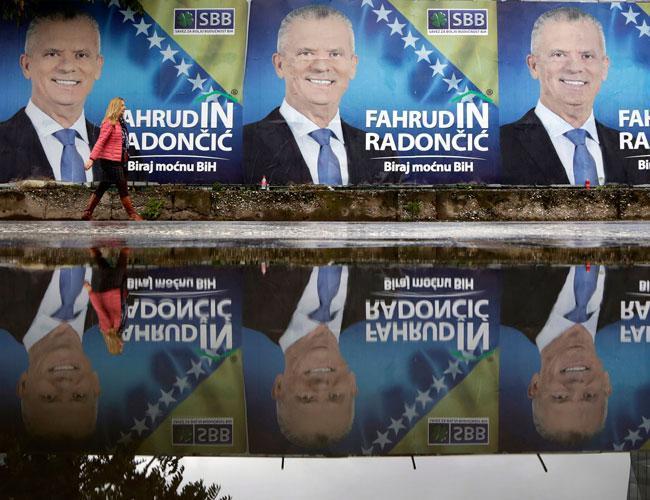
Elections in Bosnia on Oct. 7 risk cementing the ethnic divisions of the country’s brutal war, as a pro-Russian nationalist runs for the three-member presidency and politicians seeking other posts campaign on war wounds rather than reforms.
Some 3.3 million voters are being asked to fill the national presidency and other elected positions in the complex network of institutions established in the accords that ended the Bosnian War. The 1992-95 war among Serbs, Croats and Muslims during the breakup of Yugoslavia left more than 100,000 people dead and millions homeless.
Bosnia today consists of a Serb entity, a Muslim-Croat entity and a central government that holds both together loosely. Voters are choosing the three members of the Bosnian presidency, the president of the Bosnian Serb entity, assembly seats at all levels and cantonal authorities.
The results could determine whether Bosnia is strengthened as a unified, multiethnic country or fragments again along ethnic lines. The vote is seen as a test of whether a place ravaged by ethnic war and unemployment will move closer to European Union and NATO membership or remain mired by historical resentments.
Alarmed by mounting Russian influence, the West recently has renewed its push to encourage Balkan nations to solve the disputes stemming from the 1990s breakup of Yugoslavia to be eligible for EU integration.
But campaigning in Bosnia has offered little hope of change, with leaders in both the Serb mini-state and the Muslim-Croat part of the country sticking to their divisive rhetoric.
The discussion is largely empty of any issues of concern for the citizens,” said analyst Adnan Huskic. “Invoking conflict or basically scaring people into submission has been one of the main political strategies for a long time.”
The election’s main focus has been on Bosnian Serb President Milorad Dodik’s bid to win a seat in the multiethnic presidency. Dodik advocates the eventual separation of Serbs from the rest of the country, the same goal that helped fuel the war.
The United States last year imposed sanctions on the Bosnian Serb leader. He has accused the U.S. and Britain of funneling money to his opponents to weaken the Serb mini-state and even threatened in a speech to fire any worker from a public company who votes for an opposition coalition.
Russian President Vladimir Putin has endorsed Dodik, who as a member of the presidency would likely strengthen Russia’s role in Bosnia and undermine the country’s already fragile multiethnic institutions.
“Today, they are forcing us again to live with those we couldn’t live with in a big Yugoslavia,” Dodik said this week in Belgrade, the capital of neighboring Serbia. “The only response is to strengthen the Serb political and national identity.”
Within the Muslim-Croat federation, political bickering for months had stalled the approval of a key election law. There, too, a main presidential contender is seeking the formation of a third, Croat entity, leading to more divisions.
No reliable public opinion polls exist to predict the election’s outcome. Campaigning has been marred by accusations of irregularities.
Political analysts say established groups in Bosnia leave little room for candidates who want Bosnia to be cohesive and ensure citizens’ equality regardless of ethnicity.
The country with a population of 3.5 million remains politically and economically stuck. More than one-third of its people are unemployed, and the lack of jobs has sent tens of thousands of young Bosnians elsewhere to look for work since the last election in 2014.
“It’s no wonder that the youth are leaving. I wouldn’t stay for a day if I were any younger,” said Miroslav Bjelica, 65, a former Serb fighter.
Observers say voter apathy precludes an election surprise.
“There is no critical mass to pull out the change,” said Tanja Topic, an analyst from Banja Luka, the main city in the Bosnian Serb half of the country.